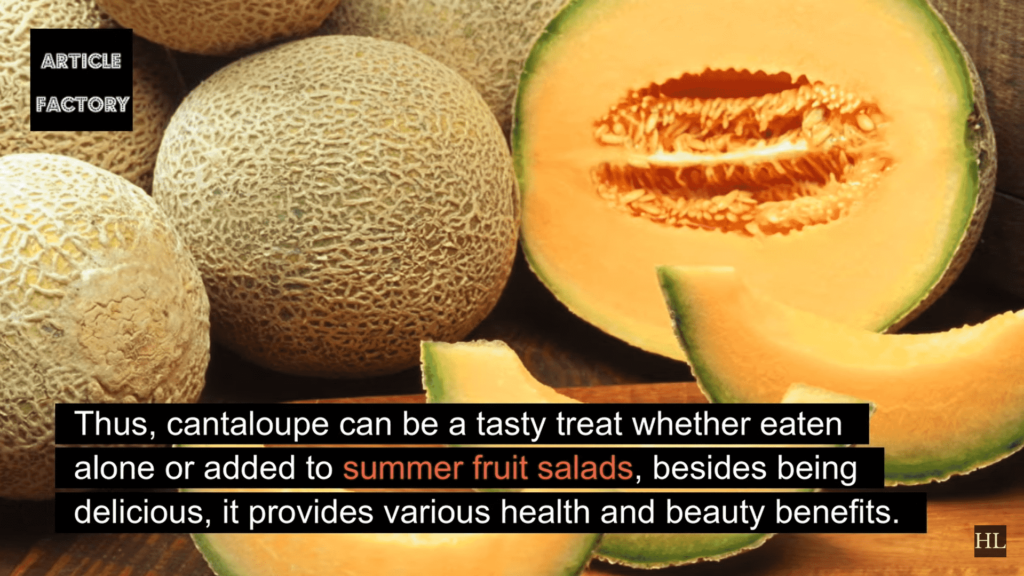Yes, cantaloupes are good for diabetics as they have a low glycemic index and contain lots of water and nutrients, making them a healthy choice for managing blood sugar levels. Cantaloupes can be highly beneficial and refreshing during summers because of their high-water content and nutritional properties.
This fruit has a low glycemic index, which means it doesn’t cause a rapid spike in blood sugar levels. Additionally, cantaloupes are packed with vitamins, minerals, and antioxidants that offer numerous health benefits. Including cantaloupes in a diabetic diet can help regulate blood sugar, support weight management, and promote overall well-being.
However, as with any food, portion control is key, so it’s essential to consume cantaloupes in moderation.

Understanding Diabetes
Diabetes is a chronic condition that affects millions of people worldwide. It occurs when the body is unable to properly regulate blood sugar levels, leading to high glucose levels in the bloodstream. This can result in various complications, including heart disease, kidney problems, and nerve damage.
Defining Diabetes
Diabetes can be classified into different types, including type 1 diabetes, type 2 diabetes, and gestational diabetes. In type 1 diabetes, the body’s immune system mistakenly attacks the insulin-producing cells in the pancreas. As a result, the body is unable to produce sufficient insulin, which is necessary for glucose to enter the cells and be used as energy. Type 2 diabetes, on the other hand, occurs when the body becomes resistant to the effects of insulin or doesn’t produce enough insulin. Gestational diabetes develops during pregnancy and usually resolves after childbirth.
Impact Of Diet On Diabetes
Proper nutrition plays a crucial role in managing diabetes. A well-balanced diet can help stabilize blood sugar levels and prevent spikes and crashes. It is important for individuals with diabetes to choose foods that have a low glycemic index. The glycemic index (GI) rates foods based on how quickly they raise blood sugar levels. Foods with a high glycemic index cause a rapid spike in blood sugar, while those with a low glycemic index release glucose slowly, helping to maintain stable blood sugar levels.
When it comes to fruits for diabetics, it is crucial to consider their impact on blood sugar levels. Despite their natural sugars, certain fruits can be a part of a diabetes-friendly diet, including cantaloupes. Cantaloupes have a low glycemic index, which means they have a minimal impact on blood sugar levels. This makes them a suitable choice for individuals with diabetes who want to enjoy a sweet and refreshing fruit.
Additionally, cantaloupes are rich in vitamins, minerals, and fiber. These nutrients are essential for overall health, including managing blood sugar levels. The fiber content in cantaloupes helps slow down the digestion and absorption of carbohydrates, preventing rapid spikes in blood sugar levels.
It’s important to note that while cantaloupes can be incorporated into a diabetic diet, portion control is key. Moderation is key when consuming any food, including fruits. It’s recommended to consult a healthcare professional or a registered dietitian to determine appropriate portion sizes and to ensure that cantaloupes fit into an individual’s overall meal plan.
In conclusion, understanding the impact of diet on diabetes is crucial in managing blood sugar levels. Choosing low glycemic index fruits like cantaloupes can be beneficial for individuals with diabetes. However, it’s important to consume them in moderation and as part of a well-balanced meal plan. Consulting a healthcare professional is always recommended for personalized dietary advice.

Cantaloupes And Diabetes
With a low glycemic index, cantaloupes can be a good choice for diabetics. They provide essential nutrients and fiber while helping to regulate blood sugar levels. Incorporating cantaloupes into a balanced diet can be beneficial for those managing diabetes.
Glycemic Index Of Cantaloupes
Cantaloupes have a low glycemic index (GI). The GI measures how quickly a particular food raises blood sugar levels. Foods with a low GI are digested more slowly, resulting in a gradual increase in blood sugar levels. For diabetics, this is especially important as it helps prevent spikes in blood sugar levels that can cause complications. The GI of Cantaloupes is around 65, which is considered low. This makes cantaloupes a safe and beneficial fruit to include in a diabetic’s diet.
Nutritional Benefits For Diabetics
Cantaloupes offer a range of nutritional benefits that make them a valuable addition to a diabetic’s diet. They are low in calories and high in water content, making them a satisfying and hydrating fruit choice. Cantaloupes are also packed with essential vitamins and minerals. They are rich in vitamin A, vitamin C, and potassium, which are important for maintaining overall health and supporting the immune system. Additionally, cantaloupes contain dietary fiber, which helps regulate blood sugar levels and improves digestion.
To summarize, cantaloupes have a low glycemic index and offer numerous nutritional benefits for diabetics. They are a delicious and refreshing fruit that can be enjoyed as a part of a balanced diet. Including cantaloupes in your meals can help manage blood sugar levels and promote overall health and well-being. So go ahead and indulge in this tasty fruit while keeping your diabetes under control.
Best Fruits For Diabetics
Cantaloupes, with their high-water content and nutritional properties, are a refreshing and beneficial fruit for diabetics, especially during the summer. They can be enjoyed as part of a healthy, balanced diet for individuals with diabetes.
Top Fruit Choices
When it comes to managing diabetes, choosing the right fruits is essential for maintaining stable blood sugar levels. Opting for fruits low in sugar and high in fiber can benefit individuals with diabetes. Among the top fruits for diabetics are:
– Kiwi: With its low glycemic index, kiwi is a great choice for diabetics as it helps regulate blood sugar levels.
– Citrus fruits: Oranges, grapefruits, and lemons are rich in vitamin C and fiber, making them excellent options for diabetics.
– Avocados: Although technically a fruit, avocados are low in carbohydrates and contain healthy monounsaturated fats, making them a diabetic-friendly choice.
– Apricots: These fruits are packed with fiber and have a low glycemic index, making them a nutritious option for diabetics.
– Peaches: Rich in vitamins and minerals, peaches are a good choice for diabetics when consumed in moderation.
– Cherries: These fruits are low in calories and high in antioxidants, making them a diabetic-friendly option.
Fruits To Avoid
While there are fruits that benefit individuals with diabetes, there are also those that should be consumed in moderation or avoided altogether. Fruits to avoid include:
– Fruit juice: It’s best to avoid fruit juices as they are high in sugar and lack the fiber found in whole fruits.
– Dried fruit: Dried fruits often have a concentrated amount of sugar, making them unsuitable for individuals with diabetes when consumed in large quantities.
– Product labels: Always check product labels for added sugars and opt for whole fruits instead.
In conclusion, incorporating the right fruits into a diabetic diet is crucial for maintaining blood sugar levels and overall health. By choosing low-sugar, high-fiber fruits and avoiding fruit products high in added sugars, individuals with diabetes can enjoy a wide range of delicious and nutritious options.
Dietary Guidelines For Diabetics
When managing diabetes, following the right dietary guidelines is crucial for maintaining stable blood sugar levels. For diabetics, eating habits play a significant role in overall health and well-being.
Portion Control
- Carefully monitor portion sizes to control carbohydrate intake.
- Avoid consuming oversized servings to prevent blood sugar spikes.
- Opt for smaller portions of fruits to maintain glucose levels.
Balancing Fruit Consumption
- Include a variety of fruits in your diet for essential vitamins and minerals.
- Enjoy fruits with lower sugar content like cantaloupes in moderation.
- Limit intake of high-sugar fruits to manage blood glucose levels effectively.
Myth Busting
Dispelling Common Misconceptions
Many believe that sweet-tasting fruits like cantaloupes are not suitable for diabetics, but this myth needs to be debunked. Cantaloupes can actually be a good choice for individuals with diabetes when consumed in moderation.
Importance Of Moderation
It is essential for diabetics to understand the significance of moderation when including fruits like cantaloupes in their diet. While cantaloupes are nutritious and low in calories, portion control is key to managing blood sugar levels effectively.
Health Benefits Of Cantaloupes
Cantaloupes are not only delicious but also offer a range of health benefits, making them a great addition to the diet of individuals with diabetes. Let’s explore the health benefits of cantaloupes for diabetes management.
Rich In Essential Nutrients
Cantaloupes are rich in essential nutrients, including vitamins A and C, which contribute to a healthy immune system and antioxidant properties. Additionally, they contain potassium and dietary fiber, supporting heart health and digestive function.
Supporting Diabetes Management
Cantaloupes have a low glycemic index, meaning they won’t cause rapid spikes in blood sugar levels. The fiber content in cantaloupes can aid in regulating blood sugar levels, promoting steady glucose absorption. Moreover, the high water content in cantaloupes helps in keeping the body hydrated, which is crucial for individuals with diabetes.

Risks And Considerations
When it comes to managing diabetes, it is essential to consider the risks and potential impact of the food choices we make. While cantaloupes are generally considered a healthy fruit option, there are a few factors to keep in mind for individuals with diabetes.
Potential Sugar Content
One of the primary concerns for people with diabetes is the sugar content in the foods they consume. Cantaloupes have a sweet taste, which might raise concerns about their suitability for diabetics. However, when you consider the glycemic index (GI) of cantaloupes, you’ll find that they have a relatively low value. This means that cantaloupes do not cause a rapid spike in blood sugar levels, making them a safe choice for diabetics.
Individual Tolerance Levels
It’s important to keep in mind that everyone’s body reacts differently to certain foods, including fruits like cantaloupes. Some individuals may experience a higher blood sugar response after consuming cantaloupes, while others may have no noticeable effect at all. Therefore, it is crucial for diabetics to monitor their blood sugar levels and determine their individual tolerance levels for cantaloupes.
In conclusion, while cantaloupes are generally considered safe and beneficial for individuals with diabetes, it is essential to be mindful of portion sizes and individual tolerance levels. Including cantaloupes as part of a balanced diet can provide essential nutrients and the refreshing taste of this delicious fruit.
Practical Tips
Cantaloupes can be a good choice for diabetics due to their high-water content and nutritional properties, making them refreshing and beneficial during the summer. They are a low-sugar fruit and can be included in a healthy, balanced diet for individuals with diabetes.
Incorporating Cantaloupes Into Diet
When it comes to managing diabetes, making informed dietary choices is crucial. If you’re a fan of cantaloupes and wondering whether you can enjoy this delicious fruit while keeping your blood sugar levels in check, the answer is yes! Cantaloupes are a diabetic-friendly fruit as they have a low glycemic index, meaning they don’t cause significant spikes in blood sugar levels.
To incorporate cantaloupes into your diet without affecting your blood sugar levels, here are some practical tips:
Consulting Healthcare Providers
Prior to making any significant changes to your diet, it is essential to consult with your healthcare provider, especially if you have diabetes. They will be able to provide you with personalized guidance based on your specific health needs and help create a diabetes management plan that incorporates the inclusion of cantaloupes.
Portion Control
It is important to practice portion control when consuming cantaloupes. While they are a healthy fruit choice, consuming too much can still impact blood sugar levels. Aim for around one cup of diced cantaloupe, which is approximately 60 grams of carbohydrates. You can incorporate it as a snack or as part of a balanced meal.
Pairing With Protein Or Healthy Fats
To further minimize the impact of cantaloupes on blood sugar levels, consider pairing them with a source of protein or healthy fats. This can help slow down the digestion and absorption of carbohydrates. Some options include adding a handful of nuts, a tablespoon of nut butter, or enjoying cantaloupe alongside a protein-rich Greek yogurt.
Monitoring Blood Sugar Levels
When incorporating cantaloupes into your diet, it is important to monitor your blood sugar levels regularly. This will help you understand how your body responds to the fruit and allow you to adjust your portion sizes if needed.
Variety Is Key
While cantaloupes are delicious and nutritious, it is important to have a diverse range of fruits in your diabetic diet. By including a variety of fruits, you can obtain a wider array of essential nutrients and maximize the health benefits. Consider incorporating other low-glycemic fruits such as berries, citrus fruits, and avocados into your meals and snacks.
Remember, managing diabetes successfully is not only about what you eat but also how you balance various food groups and maintain an overall healthy lifestyle. By incorporating cantaloupes, monitoring your blood sugar levels, and consulting with your healthcare provider, you can enjoy the sweet, refreshing taste of this fruit without compromising your diabetes management.
Cantaloupe Recipes For Diabetics
If you have diabetes, it’s essential to carefully consider the fruits you consume, as they can impact blood sugar levels. Cantaloupes, with their low glycemic index and high nutritional value, can be a great addition to a diabetic-friendly diet. Here are some delicious cantaloupe recipes that are suitable for individuals managing diabetes:
Low-sugar Cantaloupe Dishes
When preparing cantaloupe dishes for individuals with diabetes, it’s crucial to keep the sugar content low. Here are some diabetes-friendly cantaloupe recipes that are both delicious and low in sugar:
- Cantaloupe Salad with Feta Cheese and Mint
- Cantaloupe and Cucumber Gazpacho
- Cantaloupe and Prosciutto Skewers
Healthy Cantaloupe Snack Ideas
For those managing diabetes, opting for healthy snack choices is important. Incorporating cantaloupe into snacks can provide both flavor and nutrients. Here are some tasty and healthy cantaloupe snack ideas:
- Fresh Cantaloupe Slices with a Sprinkle of Cinnamon
- Cantaloupe and Greek Yogurt Parfait
- Cantaloupe and Cottage Cheese Bowl
By using these diabetes-friendly cantaloupe recipes, you can enjoy the sweet and refreshing flavors of this fruit while keeping your blood sugar levels in check.
Expert Insights
Nutritionists emphasize that cantaloupes are a great choice for diabetics due to their low glycemic index.
They contain antioxidants and fiber that can help regulate blood sugar levels.
Diabetes specialists suggest that moderation is key when including cantaloupes in a diabetic diet.
Portion control and considering overall dietary balance are essential.
Regular monitoring of blood sugar levels is recommended when consuming cantaloupes.
Lifestyle Considerations
When it comes to managing diabetes, lifestyle considerations play a crucial role in maintaining overall health. Two key lifestyle aspects that significantly impact diabetes management include physical activity and dietary balance.
Physical Activity And Diabetes
Regular physical activity is essential for individuals with diabetes as it helps control blood sugar levels and improves overall health. Engaging in activities like brisk walking, cycling, or swimming can have a positive impact on managing diabetes.
Overall Dietary Balance
Achieving a balance in your diet is paramount for individuals with diabetes. Incorporating a variety of nutrient-dense foods like fruits, vegetables, whole grains, and lean proteins is vital for maintaining stable blood sugar levels.
Comparing Melons
When it comes to managing diabetes, choosing the right fruits is crucial. Among the various options, melons are a popular choice for their refreshing taste and nutritional benefits. Let’s compare different melons and explore their suitability for diabetes management.
Cantaloupes Vs. Other Melons
When considering melons for a diabetic diet, it’s essential to understand the differences between various varieties. Cantaloupes, honeydews, and watermelons are among the most consumed melons and have distinct nutritional profiles that impact their suitability for diabetics.
Benefits Of Different Melon Varieties
Each melon variety offers unique health benefits that can influence their inclusion in a diabetic meal plan. For instance, cantaloupes are rich in vitamins A and C, while watermelons are known for their high water content and lycopene levels. Honeydews, on the other hand, provide potassium and fiber. Understanding these differences can aid diabetics in making informed choices based on their nutritional needs and glycemic impact.
Consumer Tips
When it comes to including cantaloupes in a diabetic diet, there are some important consumer tips to keep in mind. From selecting ripe cantaloupes to storage and preservation techniques, these tips will help you incorporate this nutritious fruit into your meals in a safe and effective way.
Selecting Ripe Cantaloupes
Choosing ripe cantaloupes is crucial, as it ensures you get the maximum flavor and nutritional benefits. Follow these tips to select the perfect ripe cantaloupe:
- Look for cantaloupes that have a firm, symmetrical shape.
- Check for uniform, beige netting on the skin. Avoid cantaloupes with green patches or soft spots.
- Give it a gentle press on the stem end – it should yield slightly but not be too soft or mushy.
- Smell the blossom end – it should have a sweet aroma.
Storage And Preservation
Once you’ve selected the ripe cantaloupes, it’s important to store and preserve them properly to maintain their freshness. Here are a few guidelines to follow:
- Store whole cantaloupes at room temperature until fully ripe. Once ripe, transfer them to the refrigerator to slow down further ripening
- If you have cut cantaloupes, store them in an airtight container in the refrigerator. Consume within three to four days to ensure optimal flavor and texture.
- When freezing cantaloupes, it’s best to dice them into small cubes and place them in a freezer-safe bag or container. This allows for easy portioning and prevents freezer burn.
By following these consumer tips, you can make the most of cantaloupes while managing your diabetes. Enjoy the sweet and juicy flavors with confidence!
Personal Experiences
When it comes to managing diabetes, diet plays a vital role. Finding the right balance of nutritious foods that won’t negatively impact blood sugar levels can be a challenge. Cantaloupes, with their sweet and refreshing flavor, are often a popular choice among those with diabetes. Let’s explore the personal experiences of diabetics who have incorporated cantaloupes into their diets and the success stories they have to share.
Diabetic Perspectives On Cantaloupe Consumption
Many individuals with diabetes have found that incorporating cantaloupes into their diet has had a positive impact on their overall health. Here are some perspectives:
- Steady Blood Sugar Levels: Several diabetics have reported that adding cantaloupes to their meal plans helped in maintaining stable blood sugar levels throughout the day. This is an important factor in diabetes management and can greatly contribute to overall well-being.
- Sweet Cravings Satisfied: One of the challenges of having diabetes is dealing with sugar cravings. Cantaloupes, while naturally sweet, are relatively low in sugar compared to other fruits. Many individuals have found that enjoying a small portion of cantaloupe helps satisfy their sweet tooth without causing spikes in blood sugar levels.
- Improved Hydration: Staying hydrated is essential for overall health, and cantaloupes are a great source of hydration due to their high water content. Diabetics who incorporate cantaloupes into their diets have reported feeling more hydrated and refreshed throughout the day.
Success Stories With Cantaloupe
Here are some inspiring success stories shared by diabetics who have experienced positive outcomes after consuming cantaloupes:
“I have been living with diabetes for over 10 years, and incorporating cantaloupes into my diet has been life-changing. My blood sugar levels have stabilized, and I no longer have intense sugar cravings. Plus, I love how refreshing and hydrating cantaloupes are.” – John, 47
“As a diabetic, finding fruits that won’t cause a spike in my blood sugar levels can be challenging. Cantaloupes have been a game-changer for me. I can enjoy their natural sweetness without worrying about my sugar levels. Eating cantaloupes regularly has helped me stay on track with my diabetes management.” – Sarah, 36
These success stories highlight the positive impact that cantaloupes can have on individuals with diabetes. However, it’s important to remember that every person’s experience may vary. Consulting with a healthcare professional or registered dietitian is recommended before making any significant changes to your diet.

Research Findings
Recent studies have shed light on the relationship between cantaloupes and diabetes, providing valuable scientific evidence on the consumption of cantaloupes for individuals with diabetes. The latest research findings emphasize the impact of cantaloupes on blood sugar levels and overall health for diabetics.
Latest Studies On Cantaloupes And Diabetes
Several recent studies have explored the potential benefits of consuming cantaloupes for individuals with diabetes. Researchers have focused on the fruit’s glycemic index and its effects on blood glucose levels. These studies aim to provide insights into whether cantaloupes can be included in a diabetic-friendly diet.
Scientific Evidence
Scientific evidence supports the inclusion of cantaloupes in the diets of individuals with diabetes. The fruit’s low glycemic index and high water content make it a favorable choice for managing blood sugar levels. Additionally, cantaloupes are rich in essential nutrients, including vitamins A and C, which are beneficial for overall health.
Global Perspectives
Exploring the worldwide view on the suitability of cantaloupes for individuals with diabetes unveils interesting insights from various corners of the globe.
Cultural Beliefs And Dietary Practices
In different cultures, there are diverse beliefs and practices concerning the consumption of cantaloupes by diabetics.
International Consumption Of Cantaloupes
Across the globe, the consumption of cantaloupes varies, impacting the dietary choices of those with diabetes.
Additional Resources
Additional Resources:
Reputable Websites For Diabetes Information
1. Times of India – Life style section offers insights on the best fruit choices for diabetics.
2. Healthline – Features articles on low-sugar fruits and recommended diet for diabetics.
3. WebMD – Provides detailed health benefits of fruits suitable for individuals with diabetes.
4. Verywell Health – Offers pros and cons of consuming fruits, with a focus on diabetes management.
5. Medical News Today – Highlights fruits to avoid and include in a diabetic diet for optimal health.
Recommended Reading Materials
1. A1C Chart – Insightful resource for understanding blood glucose levels and diabetes management.
2. Diabetes Management Survey – Provides comprehensive information on managing diabetes effectively.
3. Mental Health & Diabetes – Explores the correlation between mental health and diabetes for holistic well-being.
4. Healthcare Associates of Texas – Offers guidance on safe fruit consumption for individuals with diabetes.
5. Canadian Insulin – Information on specific fruits like cantaloupe and their impact on blood sugar levels.
Frequently Asked Questions For Are Cantaloupes Good For Diabetics
Which Melon Is Best For Diabetics?
The best melon for diabetics is cantaloupe. It has a low glycemic index and high water content, making it a good choice.
What Is The Best Fruit For Diabetics To Eat?
The best fruit for diabetics is cantaloupe, known for its low sugar content and high nutritional value.
Is Cantaloupe High In Sugar?
Cantaloupe is not high in sugar, making it a suitable fruit choice for individuals watching their sugar intake.
Can Diabetics Eat Pineapple And Cantaloupe?
Yes, diabetics can eat pineapple and cantaloupe in moderation. Consider portion size and how they fit into your overall diet.
Can Diabetics Eat Cantaloupes Safely?
Cantaloupes can be consumed by diabetics in moderation due to their low glycemic index and high nutritional content.
What Are The Benefits Of Cantaloupes For Diabetics?
Cantaloupes are rich in vitamins, antioxidants, and fiber, aiding in blood sugar control and overall health for diabetics.
How Does Cantaloupe Impact Blood Sugar Levels?
Cantaloupes have a low glycemic index, causing a gradual increase in blood sugar levels, making them a suitable choice for diabetics.
Are There Any Precautions Diabetics Should Take While Eating Cantaloupes?
Diabetics should monitor portion sizes, consider overall carbohydrate intake, and balance Cantaloupe consumption with their meal plan.
Conclusion
Cantaloupes can be included in a diabetic diet, given their low glycemic index and high nutritional value. Consuming them in moderation can provide essential nutrients and help manage blood sugar levels. However, it’s crucial to monitor portion sizes and consider individual dietary needs.
Integrating cantaloupes into a balanced meal plan can offer variety and health benefits for individuals with diabetes.

